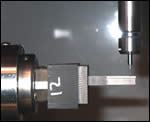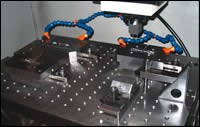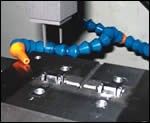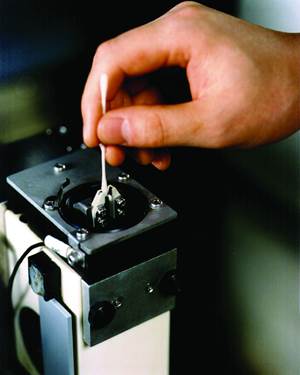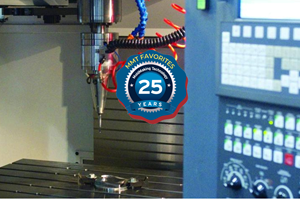EDM Additions Equal Productivity and Profitability
EDM Additions Equal Productivity and Profitability
Gene Siemen is typical of many mid-sized mold shop owners in the greater Detroit market. He has been forced to downsize Unytrex, Inc. (Shelby Township, MI)—a mold shop specializing in plastic injection molds—to remain competitive. Because of this, he began looking into purchasing some new EDM equipment to increase productivity and profitability with a smaller workforce.
Unytrex's customers range from the telecommunications industry and consumer products to automotive—which comprises approximately 50 percent of his business. With an 8,000-square foot facility and seven employees, Siemen elected to invest in a Mitsubishi EX22 CNC sinker—which immediately increased his throughput and profitability by 50 percent—compared to his previous manual method of EDM'ing. Siemen also wanted to ensure that the equipment would maintain tight tolerances and leave an even, textured finish.
Advantages Aplenty
An added bonus to using the Mitsubishi CNC sinker is the ability to burn consistently accurate molds during the evening hours—unattended—Siemen points out. And, the patented fuzzy logic technology inherent to the machine allows it to adapt to unstable burn conditions, making adjustments to all of the discharge parameters automatically, to continue the burn. If the machine senses the burn conditions are favorable, the machine controller will make the burn more aggressive to remove metal faster—while still maintaining good surface finishes.
"Most CNC EDMs are reactive in nature," Siemen notes. "Basically they will react to an unstable burn condition by powering down to alleviate any arcs or secondary discharge. Mitsubishi is a proactive system—allowing the machine to get more aggressive if the burn allows for it. This adds up to faster burn times in difficult-to-machine jobs such as ribs or very detailed, intricate features. This machine is very reliable and it allowed me to reduce my manpower to get away from the manual way of thinking." This also added to the company's bottom line, and it quickly became apparent to Siemen that he needed to improve on his electrode making method.
Like most shops that machine graphite, an older machine is usually retrofitted with a vacuum system to attempt to collect the dust created during machining. This results in graphite dust settling all over the shop and eventually causing machine problems by damaging other machine controllers, spindles, and anything else the dust will attract itself to. Siemen wanted a machine specially designed to machine graphite electrodes with a sealed enclosure, built-in vacuum system, and the machine structure created with graphite machining in mind. The machine also needed high spindle speeds to accelerate his machining speed—the Mitsubishi EDM was burning so quickly the older machine simply couldn't keep up.
Unytrex's bottleneck was the machining of the electrodes. The older machine the shop was using produced the electrodes slowly, and the electrodes required hand benching after machining. The finishes were inadequate to produce the types of molds the Mitsubishi was capable of burning. The labor involved in hand benching graphite is very time-consuming and detracted from the shop's overall productivity.
His quest to find an accurate machine with fast-cutting capability, designed for graphite, ended with the Roku Roku GR658 from MC Machinery Systems (Wood Dale, IL) and has experienced incredible success. The machine offers a standard 32,000-rpm spindle with outstanding cutter life due to the lack of runout in the spindle. Roku Roku—a family-owned company in Japan for more than 100 years—has specialized in building spindles with speeds as high as 200,000 rpm. The technology employed in these spindles is such that it will run at consistently high rpm while maintaining excellent thermal stability—which in turn reduces runout. The electrodes are coming off the Roku Roku virtually finished. Absolutely no benching is required, and the accuracy off the machine is exceptional.
"When you can hold the electrode within a tenth of two, the entire process is improved to maximize my throughput," Siemen states. "The Mitsubishi burns better because there is better consistency in the burn. Superior electrodes improve my productivity—and thus my profitability—exponentially with the addition of the Roku Roku."
The Roku Roku also helped his bottom line by eliminating the time-consuming labor involved in the benching. In today's global marketplace, it is necessary for smaller mold shops to continue reinventing themselves by investing intelligently in the latest and highest level of technology to compete with their counterparts in China and the Pacific Rim.
"Our competitors are no longer down the road or across the highway—they are across the ocean," Siemen says. "And I know that if I can burn faster and remove as much of the labor out of my process I will remain profitable. The combination of the Mitsubishi CNC sinker and the Roku Roku CNC machining center has allowed me to do more than just stay competitive—they have allowed me to stay in business."
Related Content
Revisiting Some Hot Runner Fundamentals
What exactly does a hot runner do? If you’ve been in the injection molding industry for any length of time, you might think the answer is obvious, but it is not.
Read MoreMaintaining a Wire EDM Machine
To achieve the ultimate capability and level of productivity from your wire EDM on a consistent, repeatable and reliable basis, regular maintenance is a required task.
Read MoreMachine Hammer Peening Automates Mold Polishing
A polishing automation solution eliminates hand work, accelerates milling operations and controls surface geometries.
Read MoreTreatment and Disposal of Used Metalworking Fluids
With greater emphasis on fluid longevity and fluid recycling, it is important to remember that water-based metalworking fluids are “consumable” and have a finite life.
Read MoreRead Next
How to Use Strategic Planning Tools, Data to Manage the Human Side of Business
Q&A with Marion Wells, MMT EAB member and founder of Human Asset Management.
Read MoreReasons to Use Fiber Lasers for Mold Cleaning
Fiber lasers offer a simplicity, speed, control and portability, minimizing mold cleaning risks.
Read More


